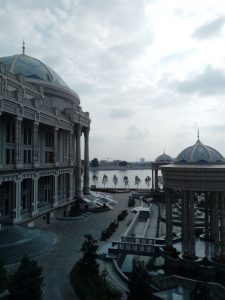Номи ман Сам аст ва ин моҳ ба Душанбе, пойтахти Ҷумҳурии Тоҷикистон, барои таҷрибаомӯзиям омадам. Дар донишгоҳ забони форсию забоншиносӣ таҳсил мекунам. Тоҷикӣ як забони Осиёи Марказӣ аст, ки наздики форсӣ аст, вале бо хатти кириллик навишта мешавад. Дар ин “блог”ҳо умедворам, ки хотироти хуб дар бораи ин кишвар гузорам. Махсусан кишвари Тоҷикистонро бисёр мардуми Аврупо намедонанд!
Оилаи тоҷикии ман бисёр меҳрубон аст ва онҳо як кӯдаки думоҳа доранд ки хеле ширин аст. Ман аллакай бо одамони зиёде дар оилаи калонашон шинос шудам, ки фаромӯш мекунам ки кӣ аст. Ҳафтаи пеш, падар аз оила ба тӯй дар қишлоқ як соат аз шаҳр маро даъват кард ки бисёр аҷоиб буд. Чизе ба ман ҳам ҷолиб буд, ки махсусан дар чорабинӣ мисли тӯй, барои аксар вақт занону мардон ҷудо мешинанд.
Унвони ин блог “халқи ош” аст чунки тоҷикҳо барои ош (таоми миллии онҳо) як ҷои махсус дар дилашон доранд. Ош таоме аст ки аз биринҷ, равған, гӯшт, наҳуду сабзиҳои реза дар дег пухта мешавад. Ба тоҷикӣ “restaurants” ва “cooks” номҳои “ошхонаҳо” ва “ошпазон” аст ва вақте ки дар гулӯ ягон чиз аз хӯрдан дар мегирад, бо даст дар пушт зада “ош” мегӯянд … Акнун шумо медонед ки ош чи қадар муҳим аст. Ё тоҷикҳо мегӯянд “баъд аз ош, як дам бош!”
Душанбе, шаҳрест, ки ман зиндагӣ мекунам, шаҳри хеле ҷавон аст. Вақте Тоҷикистон вилояти мухтор дар Иттиҳоди Шӯравӣ буд, русҳо даррав як маркази минтақавӣ барои ин минтақаи кӯҳии деҳоти Осиёи Марказӣ барпо карданд. Русҳо қишлоқи хӯрди Душанберо интихоб карданд пойтахташро бошад (ба забони тоҷикӣ/форсӣ “Душанбе” маъно “Monday” дорад чунки ин қишлоқ аз бозори рӯзи душанбеи маъруф буд.) Ҳозир шаҳри Душанбе тақрибан як миллион нафар дорад ва тез тараққиёт кард. Маркази шаҳрро бозсозӣ шудааст ва боғҳои калон, хиёбонҳо бо дарахтон, ва бисёри биноҳою ҳайкалҳои фарҳангии зебо ҳаст. Метавонед таъсири Русия ин ҷо ҳанӯз ҳис кунед: ҳама ин ҷо русӣ гап мезананд ва фарзандони оилаам ба мактаби русӣ мераванд ва барномаҳои русӣ тамошо мекунанд. Бештари тоҷикҳо ба ман русӣ гап мезананд, вақте аксентамро мешунаванд. Бинобар ин на камтар аз даҳ маротиба дар як рӯз бояд гӯям “мебахшед русӣ гап намезанам”.
Ҷолиби диққати чанд ҳафтаи гузашта дар Тоҷикистон – ба ғайр аз “ош” – ин скутери нави ман буд. Як скутер харидам (номаш Куруши Бузург) ва падари оилаи тоҷикиям ба ман таълими ронандагию таъмир дода истодааст. Мо дар шаб атрофи Душанбе рондаем ва вай дарсҳои бехатарии ҳаракат дар роҳ ба тоҷикӣ ба ман ёд додааст. Як мушкилоти иловагӣ аст ки ба тоҷикӣ фақат як калима барои “рост” (right/straight) аст, ки роҳнаморо мушкилтар мекунад!

Nevruz Palace in Dushanbe
My name’s Sam and I’ve just moved to Dushanbe, the capital of Tajikistan, for my year abroad. I’m studying Persian and linguistics at university, and Tajiki is a Persian language spoken in Central Asia, written in the Cyrillic script. In these blog posts I hope to share my experiences of this country, especially as Tajikistan is a country not many people know a lot about!
My host family are lovely and they have a two-month old baby who is so so cute! I’ve already been introduced to so many members of their large family I’m starting to forget who’s who. Last week my host dad took me to a Tajiki village wedding an hour outside the city which was a really interesting experience. Something I found interesting was that here, especially at an event like a wedding, the men and the women are hosted in separate rooms for most of the time.
The title of this blog post is “Land of Osh” because the Tajik people have a very special place in their heart for osh – their national dish. Osh is a rice dish cooked with oil, meat, chickpeas and carrot strips in a big pan over an open fire. Restaurants here are called oshkhonaho (osh-houses), cooks are called oshpazon (osh-cookers) and when you have the hiccups people say “osh” when they pay you on the back … So you get the idea how important this dish is! Or as a Tajik would say “ba’d az osh yak soat dam bosh!” (After Osh, time for a one hour nap).
Dushanbe, the city where I’m living, is a very new city. When Tajikistan became an autonomous oblast of the Soviet Union, the Russians had to quickly establish a regional centre for this very rural, mountainous region of Central Asia. The Russians chose the small village of Dushanbe to be the capital (“dushanbe” in Persian means “Monday”, because this village was named after its popular Monday bazaar). Now Dushanbe is a city of nearly a million people, and has developed fast. The centre has been redeveloped and there are large parks, tree-lined avenues, and lots of beautiful cultural buildings and monuments. The Russian influence here can still be felt: everyone here is a bilingual Russian speaker, the kids in my host family go to a Russian school and watch Russian TV. Most Tajiks start speaking Russian to me when they hear my foreign accent so at least ten times a day I find myself saying “mebakhshed rusi gap namezanam” (sorry I don’t speak any Russian).
The highlight of the last few weeks here in Tajikistan – aside from all the osh – has been my new scooter. I bought a little scooter (which I’ve named Kurushi Buzurg – Cyrus the Great) and my host dad has been teaching me how to ride and fix it. We’ve been going on nighttime drives around Dushanbe where he’s been giving me road safety classes in Tajiki. An added challenge is that in Tajiki the words for “straight” and “right” are the same, which makes giving directions to a learner driver a bit trickier!

Congratulations to Sam who has just been awarded a John Speak Scholarship for his time in Dushanbe, the capital of Tajikistan. Sam will be submitting monthly reports from January 2020 – keep checking in to read about his study abroad adventures. Well done Sam!